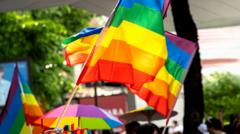Ghana’s parliament is once again at the forefront of controversy with a group of 10 Members of Parliament who have reintroduced a bill that seeks to intensify some of the strictest limitations on LGBT rights in Africa. This proposed legislation, which proposes a three-year jail sentence for individuals identifying as gay and up to ten years for those who advocate for or promote LGBT rights, follows a similar attempt last year that was unsuccessful due to the reluctance of former President Akufo Addo to sign it into law amid ongoing legal disputes.
Locally and internationally, the bill has faced widespread backlash from human rights organizations, with critics branding it as excessively harsh and detrimental. Its original iteration expired at the conclusion of the last parliamentary session, leaving its future uncertain as the new parliament considers whether to deliberate on it. Currently, same-sex relations in this conservative West African nation are already punishable by a three-year prison sentence.
President John Dramani Mahama has indicated his preference for the bill to have state sponsorship to ensure a wider basis of support and community engagement. He emphasized the necessity for a national dialogue to develop a consensus about moving forward. While proponents argue the bill is vital for upholding what they perceive to be Ghanaian cultural and familial standards, rights advocates argue it contradicts the nation’s historical principles of acceptance and hospitality.
Larissa Kojoué from Human Rights Watch criticized the bill, highlighting that it threatens both the rule of law and the safety of LGBT individuals and their allies. Veteran LGBT activist Va-Bene Elikem Fiatsi described the reintroduction of the bill as both "disheartening" and "difficult to comprehend," yet reaffirmed the ongoing commitment to LGBT rights activism.
The potential economic ramifications of the legislation are considerable, with financial experts warning that its passage could jeopardize up to $3.8 billion in development aid from the World Bank and disrupt a critical $3 billion IMF support program. Notably, opponent lawmaker John Ntim Fordjour expressed a belief that economic sanctions are no longer a concern in light of the recent shifts in global political dynamics, specifically referencing former U.S. President Donald Trump's conservative agenda.
Initially proposed in 2021, the anti-LGBT bill has encountered numerous delays and continues to spark critical discourse regarding the intersection of political policies, human rights, and cultural ethics in Ghana.
Locally and internationally, the bill has faced widespread backlash from human rights organizations, with critics branding it as excessively harsh and detrimental. Its original iteration expired at the conclusion of the last parliamentary session, leaving its future uncertain as the new parliament considers whether to deliberate on it. Currently, same-sex relations in this conservative West African nation are already punishable by a three-year prison sentence.
President John Dramani Mahama has indicated his preference for the bill to have state sponsorship to ensure a wider basis of support and community engagement. He emphasized the necessity for a national dialogue to develop a consensus about moving forward. While proponents argue the bill is vital for upholding what they perceive to be Ghanaian cultural and familial standards, rights advocates argue it contradicts the nation’s historical principles of acceptance and hospitality.
Larissa Kojoué from Human Rights Watch criticized the bill, highlighting that it threatens both the rule of law and the safety of LGBT individuals and their allies. Veteran LGBT activist Va-Bene Elikem Fiatsi described the reintroduction of the bill as both "disheartening" and "difficult to comprehend," yet reaffirmed the ongoing commitment to LGBT rights activism.
The potential economic ramifications of the legislation are considerable, with financial experts warning that its passage could jeopardize up to $3.8 billion in development aid from the World Bank and disrupt a critical $3 billion IMF support program. Notably, opponent lawmaker John Ntim Fordjour expressed a belief that economic sanctions are no longer a concern in light of the recent shifts in global political dynamics, specifically referencing former U.S. President Donald Trump's conservative agenda.
Initially proposed in 2021, the anti-LGBT bill has encountered numerous delays and continues to spark critical discourse regarding the intersection of political policies, human rights, and cultural ethics in Ghana.






















